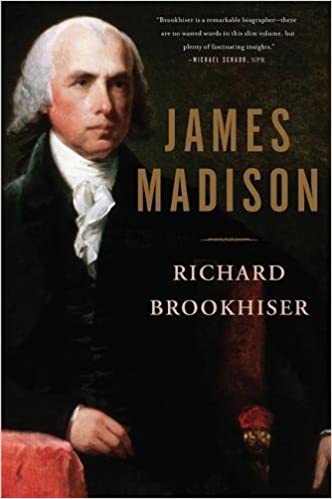“If men were angels, no government would be necessary.”
Federalist No. 51
Of all the Founding Generation, I stood to learn the most about James Madison. I knew his namesake university had an awesome mascot. Beyond that, I didn’t have much. I leaned again on Saint Stephen to guide me on the best bio available. Richard Brookhiser’s James Madison was good, informative yet concise, but had a few issues, like the excessive use of multi-comma sentences, several odd similes and its fair share of clickbait supposition (Was James Callender…murdered?!).
Syntactic quibbles aside, I learned a lot about our fourth president. Little Jemmy, as he was derisively known, was our smallest president. Five foot four and not quite a 100 pounds soaking wet, Madison suffered various stomach ailments most of his life. He was the prized protégé of fellow Virginian Thomas Jefferson. He was a learned scholar, a slave owner and the resident of the White House when the British burned it to the ground during the War of 1812.
But his real legacy remains with his quill: James Madison wrote some of the most impactful documents in the history of the United States. He helped write Washington’s first inaugural address….and the House’s response….and Washington’s response to that. To combat Adams’ Alien and Sedition Acts Madison wrote the Virginia Resolutions which, paired with Jefferson’s Kentucky version, foreboded later states rights tensions that would eventually take a divided nation to civil war. But the real pièce de résistance was the trifecta of being the primary architect of the US Constitution, the Bill of Rights and more than a third of The Federalist Papers; the latter defending, interpreting and urging for ratification of the new Constitution that he constructed. Save for Federalist co-author Alexander Hamilton, it is near impossible to argue anyone other than James Madison as the most influential scribe in the shaping of the early Republic.
Let’s back up a little bit to how he got there. When Jemmy was actually little, he grew up the eldest of twelve children on a large Virginia plantation. After extensive private tutoring courtesy of his wealthy planter father, Madison graduated Princeton in 1771 with fluency in Latin, Greek, French, Italian and even a little Hebrew. He also left with enlightened notions about philosophy, governance and individual freedoms. He read extensively in law books but never practiced himself. His education would be his armor in future fights. Given his slight stature and constant poor health, Madison’s battles during the American Revolution were fought over the wording of the first constitution for the soon-to-be-state of Virginia. His prowess in crafting this document helped his star rise into the Virginia House of Delegates and directly under the wing of then-Governor Thomas Jefferson.
Madison and Jefferson would remain allies the rest of their lives. In 1786, as Madison was preparing for the Constitutional Convention in Philadelphia the following year, Jefferson shipped him a “literary cargo” of over 200 books from Paris. In fact, he had already for years been collecting every treatise and tome he could find on governing. He produced a summary of his findings in an essay titled “Notes on Ancient and Modern Confederacies”. In all these collectives of sovereign or semi-sovereign states he found complete chaos. This chaos led to collapse, bullying by larger members or submission to foreign conquest. The lack “of subjugation in the members of the general authority ruined the whole body.” For all his later bravado about state’s rights, James Madison wanted a strong federal authority to be the backbone of the American Republic.
It was with this in mind that Madison and his state delegation took their Virginia Plan to Philadelphia. While the plan was debated, amended, minced and ultimately partially used in an overall compromise with the smaller states, Madison was an authority at the convention. Speaking over 200 times on the floor and taking copious notes, most looked his direction when needing an answer to difficult questions. While he did not get everything he wanted out of the new governing charter (still thinking it lacked enough centralized power to be effective) Madison viewed it as a tremendous upgrade to the previous Articles of Confederation. With his signature affixed alongside George Washington’s, they became the only two future presidents to sign the United States Constitution.
Writing a new form of government is one thing. Getting hundreds of self-interested, geographically distant, politically unmotivated old white men to agree it would work was quite another. Needing nine of the thirteen newly minted states to ratify, Madison joined fellow Constitutional delegate Hamilton and New Yorker John Jay in crafting a series of essays, published anonymously under the name “Publius” in papers across New York state. The essays were meant to be a measured response to the anti-federal chatter that predominated the influential Empire State after the Constitution was made public. While The Federalist Papers have remained an indispensable source of interpretation to the intentionally vague Constitution, it didn’t actually achieve it’s goal. As New Yorkers debated the question of ratification, it became a moot point when New Hampshire became the 9th state to do so a month before New York’s convention.
Many states that ratified the Constitution did so only grudgingly and with the explicit promise that a Bill of Rights would be added soon after the government was formed. That’s right history lovers, Madison would not introduce his suggested Amendments to the Constitution until almost two years after he signed the founding document. Long a vocal proponent of extensive religious freedom, Madison also advocated for the rights we hear quoted most often to this day; freedom of speech, freedom of the press, the right to peacefully assemble. Of the twelve Amendments proposed, ten made the cut and became the Bill of Rights. And just to keep the timeline updated, it was another two and a half years between the Amendments being proposed and formally adopted as law. It must also be noted that despite the explicit listings of these freedoms, Madison remained worried that anything not in the bill of rights might be construed as the right of the general government against the people.
James Madison would become a mainstay in federal politics, serving four consecutive terms in the US House and as Secretary of State in both of his Jefferson’s administrations. As Jefferson’s right hand man and subversive co-creator of the first partisan political party in American history, Madison swept into the White House easily when his mentor stepped down in 1808. Madison would lead the new party and largely craft its platform for decades to come, defined generally as agrarian, expansionist, pacific and populist.
In my view, Madison’s presidential legacy is mediocre at best. He chose his Cabinet poorly, especially his War and Navy Secretaries, which lead to moments of utter shame in the (could have been completely avoided) War of 1812. Because of his policies and partisan antics, there was talk of secession….. by New England. The industrialized northeastern states and their commercial livelihoods relied on Great Britain, leading many to call for separation from the agrarian southern-and-western-focused administration. When the country badly needed available credit, he lost a tie-breaker vote to re-charter the Bank of the United States, in no small part because years before he had so strenuously argued against said charter as unconstitutional. And, on his last day in office, he vetoed an internal improvements bill for roads and canals, despite the fact he had called for the same to be built in his last address to Congress just weeks earlier. The man who framed the Constitution might have built a few of these things in had he known he’d need them later on.
Like Jefferson, James Madison was a high-minded idealist with visions of bicoastal Manifest Destiny and that pesky slave issue just kind of, you know, dissipating as the country grew. Also like his old boss, he died deeply in debt and the owner of dozens of human beings, a slaver his entire life. The two Virginia planters shared a view that things were too far gone between the races and blacks and whites could not live in harmony together after slavery was over. He mostly pushed for colonization back to Africa.
This is when the laurels of many in the founding generation begin to wilt. Can we honor the foundational documents of this country while in the same breath dishonoring those who wrote them for their legacies of human bondage? I would like to think both things can be true; that the enslavement at Mount Vernon and Monticello and Montpelier does not invalidate the Constitution. Rather, it lives as a lasting stain; a stark and constant reminder that we can and should and will always strive for better for all the citizens under its protection.
Trivia
- Our shortest president – 5’4″
- First House Representative to serve as president
- Beat out James Monroe for his House seat!
- First president to go to war since formation of the US
- Helped Jefferson set up the University of Virginia, including the reading lists and curricula.
- Only future president besides Washington to sign the Constitution
- Helped change Virginia’s voting laws to winner-take-all for electoral votes (mainly so Federalists couldn’t pick up votes in certain districts)
- Was the resident of the White House when the British burned it down during the War of 1812 (they got out in time)
Follow-up Reading:
- The Federalist Papers
- The Constitution of the United State of America
- George Washington’s First Inaugural Address

